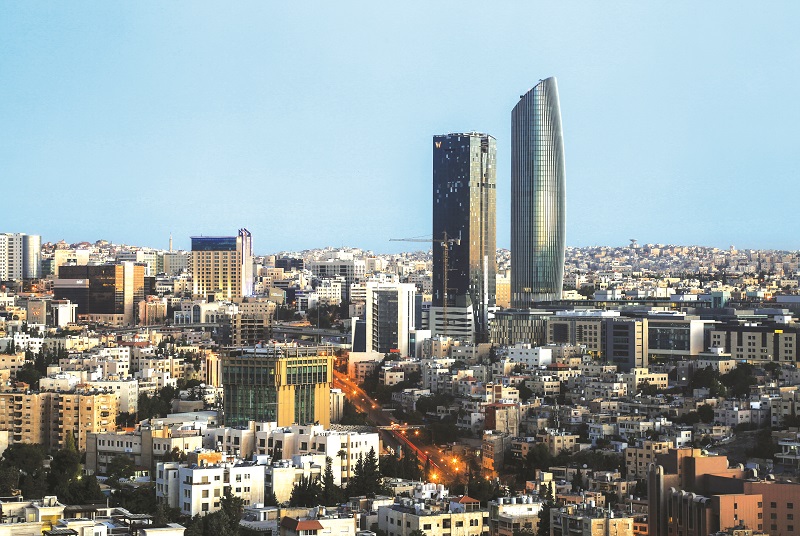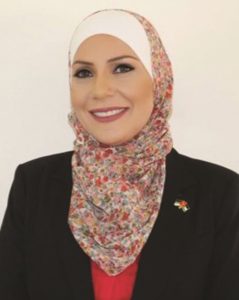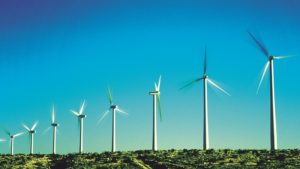On the sidelines of AMWAJ 2016*, Ruba Al-Zu’bi, the CEO of EDAMA Association, an NGO based in Jordan, spoke with Fatima de la Cerna of Climate Control Middle East about her experience as a founding member of the Jordan Green Building Council and shared details about the country’s efforts in promoting green growth and sustainable development. Excerpts from the interview…

Looking back, what challenges did you and the other founding members encounter in getting the Jordan Green Building Council started and running?
There were several challenges. The first one was being accepted as an NGO that advocated for the kind of reforms we were advocating, because the construction sector then was already among the most established in the country, which meant that its key players were known and have the support of the government. We’re talking about ministries and large professional associations, and then you have a small NGO coming in to tell them that they need to change how they do business in the sector. So, yes, getting accepted by the different institutional entities was a major challenge.

Ruba Al-Zu’bi, the CEO of EDAMA
Association.
Once we overcame that, we started talking about the codes and the changes we wanted to make. And at the time – it was 2009 – there was a growing momentum around greening the building and construction sectors, so we had the support of donors like USAID and of international agencies like the World Green Building Council. So what we did was affiliate ourselves with recognised and accredited bodies to add value to what we have in Jordan. The whole process involved bringing in international best practices and then customising them to suit Jordan.
Afterwards, we worked on mobilising a community around what we do. For the first few years, our members were basically volunteers. They were individuals and companies who wanted to volunteer their time to work out things related to new codes, policies, legislations and training courses. I think one of the factors that really helped us was the proper governance system; the ability to mobilise volunteers and the community around the cause.
As for the present challenges, I would say that the first is that we don’t have a strong enforcement process of the building codes. Jordan’s building codes are okay, but their enforcement needs to be improved. The second thing is that we don’t have incentives for those who want to go beyond compliance. The lack of incentives makes people wonder why they should do it. Those who are doing it now are people who are champions, who want something to showcase, as well as those who operate internationally and want to be recognised abroad.
They don’t have an NGO that’s only dedicated to enhancing private sector dialogue and removing the hurdles being faced by businesses
The Council now sits on the MENA Green Building Council Network, which we chair, and we also help other countries in the Arab world set up their own Green Building Councils. The only thing is that, I think, without genuine partnerships with the government, things can become really difficult. Yes, we are progressing; we are building the capacity of engineers, showcasing our success stories and working on some strategic pilots; nevertheless, if we want to expand and have mass-scale implementation, we need to have incentives and better enforcement of the building codes.
Did the founding of EDAMA face the same kind of problems? What kind of support did it get from the government? What kind of reaction and feedback did it receive?
Jordan was suffering from an energy crisis in 2007, so His Majesty King Abdullah Bin Al Hussein formed an advisory committee, chaired by His Royal Highness Prince Hamzah Bin Al Hussein, to look at what Jordan needed to do to diversify its energy mix and tackle the energy crisis.
The royal committee for the energy sector came up with a strategy that set a target for renewable energy – 10% of the total energy mix – by 2020. That was the first time Jordan introduced a renewable energy target in its strategy. But then the government recognised that it would not be able to achieve the target without the private sector, without attracting investors, and that’s how EDAMA, which means “sustainability” in Arabic, first came about. It started as an initiative that worked through a huge multi-stakeholder dialogue and taskforce with the goal of developing a strategy on how each stakeholder, including the private sector, can contribute; on how to bring about financing access, investment attraction, innovation support, R&D and SME development.
 An initiative was not enough, however. There was a need for an actual entity to take ownership of the action plans and fly with them. So EDAMA, as an NGO, as a business association, was established in 2009 to become a platform, an advocate for more private sector participation in the energy sector. We actually built a good reputation and developed a good relationship with the government, so we didn’t face many difficulties. On the contrary, EDAMA allowed us to smooth over a lot of the hurdles that our members used to face.
An initiative was not enough, however. There was a need for an actual entity to take ownership of the action plans and fly with them. So EDAMA, as an NGO, as a business association, was established in 2009 to become a platform, an advocate for more private sector participation in the energy sector. We actually built a good reputation and developed a good relationship with the government, so we didn’t face many difficulties. On the contrary, EDAMA allowed us to smooth over a lot of the hurdles that our members used to face.
Our members were the first investors in renewable energy in Jordan, and they used to come to us with a set of issues, like a lack of clear licencing procedure or some ministry not having an understanding of what’s going on. There were instances when government processes resulted in non-bankable projects; the financiers could not support them. Having all of those issues and taking them to the table to work on them, EDAMA became involved in preparing policy and position papers, and in preparing comments on legal documents. We showed that we were actually contributing to pushing Jordan’s clean energy agenda. And all the successes we’ve achieved really made up for whatever difficulties we faced as a result of the newness of the concept of a business association in the sustainability sector.
And then you have the banking sector getting more interested. We already have two banks that have green products
I was in the UAE recently, and our colleagues there find EDAMA very interesting, because they don’t have an NGO that’s only dedicated to enhancing private sector dialogue and removing the hurdles being faced by businesses. And we do this, because we believe that the private sector plays a huge role in improving the country’s GDP and global competitiveness.
How do you, as EDAMA, convince businesses to buy into the whole sustainability agenda? How do you motivate them to invest in green projects?
First, we have local investors who are keen to help develop their country. What they do is bring with them international investors. So you have people who are already in the country and who want to advance its economic development. Those parties are easy to convince and are, in fact, the main recipients of our support.
But then you also have companies that are only concerned about their bottom line.
Yes, of course. And that’s where an organisation like EDAMA comes in. When you get them as members, you start influencing them. The good thing about our community is that there are maybe three or four different reasons why we have such a diverse group of members.
 We have around 89 members. We have 36 energy and renewable energy service providers and developers; 10 commercial banks; and three telecom companies, the main ones. We also have some industrial companies involved in extraction and mining, and we have a few consulting firms dealing in the financial, legal and environmental sectors. They all come to EDAMA to become members for different reasons. There are those who see it as a door to business opportunities. They come because they’re either providing consulting services or selling products. Some, meanwhile, are exploring how to enter the green market. Many banks, for instance, are developing green products now, and are looking into offering green financing. And then there’s the third group comprising the huge energy consumers, who want to implement solutions to cut their energy use. They come to meet the right players and to listen to what options they have in the market. You have organisations that are paying some of the highest electricity tariffs in Jordan now. The telecom companies, for instance, are now developing their renewable energy plants.
We have around 89 members. We have 36 energy and renewable energy service providers and developers; 10 commercial banks; and three telecom companies, the main ones. We also have some industrial companies involved in extraction and mining, and we have a few consulting firms dealing in the financial, legal and environmental sectors. They all come to EDAMA to become members for different reasons. There are those who see it as a door to business opportunities. They come because they’re either providing consulting services or selling products. Some, meanwhile, are exploring how to enter the green market. Many banks, for instance, are developing green products now, and are looking into offering green financing. And then there’s the third group comprising the huge energy consumers, who want to implement solutions to cut their energy use. They come to meet the right players and to listen to what options they have in the market. You have organisations that are paying some of the highest electricity tariffs in Jordan now. The telecom companies, for instance, are now developing their renewable energy plants.
You mentioned green financing. What green financing options are available in Jordan?
Jordan actually has a diversity of green financing [options]. We have a fund that’s under the Ministry of Energy and Mineral Resources, called the Jordan Renewable Energy and Energy Efficiency Fund or JREEEF. It provides financing through different mechanisms to support energy efficiency and renewable energy projects. And then you have the banking sector getting more interested. We already have two banks that have green products. The Central Bank of Jordan is playing a big role, because they have a facility within the bank that lends at very low interest rates to commercial banks, so those commercial banks can, in turn, lend to consumers at low interest rates. We also have different development agencies, like the EBRD (European Bank for Reconstruction and Development), AFD (Agence Française de Développement), IFC (International Finance Corporation) and EIB (European Investment Bank) – they are all very active in Jordan. They all kind of work with the banking sector to provide financing for clean energy solutions.
Conversations on energy efficiency and sustainability tend to include talks of BMS, the Internet of Things (IoT), controls and other innovations in technology. How up-to-date would you say is Jordan’s engineering community when it comes to the latest technological trends?
I think, on one hand, we have very up-to-date graduates of universities taking the lead not only in establishing renewable energy bachelor’s or master’s degrees but also in linking to international research and education systems. On the other hand, we have universities that are still probably teaching things that have been around for 20 or 40 years, so there is this huge disconnect between the market – what’s going on in the market – and the education system.
For its part, EDAMA is trying to bridge that gap by bringing in the private sector to talk about market challenges. Now we talk about smart grids, about battery storage, among others and those kids probably haven’t even heard of those concepts. They’ve probably heard of renewables, in general, but they don’t know the specifics or where we currently are in it.
Are you getting more requests for training and certification courses for green skills?
Yes, a lot. There is a huge market in the region right now. The GCC countries, because of the Paris Agreement and efforts towards climate change mitigation, are all exploring renewable energy solutions and energy efficiency. And we export our human resources, with many of them working in the GCC, so I believe this huge global and regional momentum is creating a lot of buzz.
Speaking of the Paris Agreement, other than increasing interest in green skills, what impact has COP 21 had on Jordan and its policies and private industries?
Jordan was among the first Arab countries to prepare their INDCs (Intended Nationally Determined Contributions) before COP 21. We voluntarily determined our contributions to climate change action. We committed to reducing our emissions by 1.5%, unconditionally. That’s something we are committed to, plus 12.5% subject to the availability of financial resources. Jordan is really one of the regional leaders in this regard, although we don’t really emit a lot of greenhouse gases.
Recently, the Ministry of Environment organised a workshop to discuss post-COP 22 scenarios, and it was agreed that we need to develop a national adaptation strategy for Jordan that targets the main sectors affected by climate change. It was also discussed that we need to work on financing mechanisms and see how we can benefit from the green climate fund, as well as other existing financing channels, in order to implement our plans and projects.
Moreover, in Jordan, we have a national committee for climate change that has all the relevant ministries represented, because we believe that climate change is everybody’s business. The Ministry of Environment can’t act alone; everybody has to become involved.
*AMWAJ 2016, which ran from 28-29 November 2016 in Amman, Jordan, was an international sustainability forum organised by PepsiCo and Revolve Media.
[The writer is the Assistant Editor of Climate Control Middle East.]
Copyright © 2006-2025 - CPI Industry. All rights reserved.